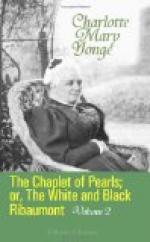Ere long, the merry cadence of an old English song fell with a homelike sound upon Sidney’s ear, and in another moment they were in sight of Berenger, trotting joyously along, with a bouquet of crimson and white heather-blossoms in his hand, and his bright young face full of exultation in his arrangements. He shouted gaily as he saw them, calling out, ’I thought I should meet you! but I wondered not to have heard the King’s bugle-horn. Where are the rest of the hunters?’
‘Unfortunately we have had another sort of hunt to-day,’ said Sidney, who had ridden forward to meet him; ’and one that I fear, will disquiet you greatly.’
‘How! Not her uncle?’ exclaimed Berenger.
’No, cheer up, my friend, it was not she who was the object of the chase; it was this unlucky King,’ he added, speaking English, ’who has been run to earth by his mother.’
‘Nay, but what is that to me?’ said Berenger, with impatient superiority to the affairs of the nation. ‘How does it touch us?’
Sidney related the abstraction of the young Queen and her ladies, and then handed over the rose-coloured token, which Berenger took with vehement ardour; then his features quivered as he read the needle-pricked words-two that he had playfully insisted on her speaking and spelling after him in his adopted tongue, then not vulgarized, but the tenderest in the language, ‘Sweet heart.’ That was all, but to him they conveyed constancy to him and his, whatever might betide, and an entreaty not to leave her to her fate.
‘My dearest! never!’ he muttered; then turning hastily as he put the precious token into his bosom, he exclaimed, ’Are their women yet gone?’ and being assured that they were not departed when the two friends had set out, he pushed his horse on at speed, so as to be able to send a reply by Veronique. He was barely in time: the clumsy wagon-like conveyance of the waiting-women stood at the door of the castle, in course of being packed with the Queen’s wardrobe, amid the janglings of lackeys, and expostulating cries of femmes de chambre, all in the worst possible humour at being crowded up with their natural enemies, the household of the Queen-mother.




